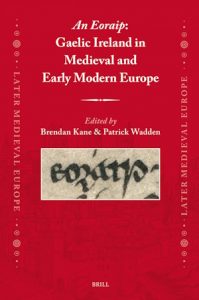Professor Andy Horowitz, author of the prize-winning book Katrina: A History, 1915–2015, has been consulted widely around Katrina’s 20th anniversary. Listen to him on NPR Morning Edition, and read his essay “Katrina’s America” in a special issue of the journal Southern Cultures that he guest edited.
Month: August 2025
Katharine Beene Successfully Defends Dissertation
On August 8th, Katharine Beene successfully defended her dissertation, “Women’s Acquisition and Transmission of Knowledge in Early Modern Ireland, 1600-1750”.
From the abstract:
This dissertation expands understandings of scientific and political advancement in Ireland from 1600-1750 by examining the often-overlooked informal learning networks of early modern Irish women, focusing on their correspondence and kinship relationships. It reveals how these women were not merely passive recipients, but active contributors to the formation and distribution of foundational knowledge in fields like medicine, science, mathematics, and politics across Western Europe. Early modern Ireland’s experience as a colony offers valuable insights into how colonial systems shape the transmission of knowledge. This dissertation argues that despite the limitations imposed by formal colonial controls on access to education, women’s informal networks played a unique role in the transfer of knowledge… Investigating women in Ireland knowledge acquisition in a kingdom-colony context provides a methodological approach to investigate informal networks and the circulation of knowledge among marginalized communities.
Congratulations to Katharine Beene on this impressive achievement!
Manisha Sinha Cited in The New York Times
Manisha Sinha was cited in a recent piece by Jamelle Bouie, which appeared in The New York Times on August 6. In the article Bouie adopts Sinha’s analogy of French republicanism, and follows her framework of different American Republics.
You can check the piece out here:
“The Death of the Fourth American Republic,” Jamelle Bouie
Alexis Dudden featured on BBC discussing Hiroshima and Nagasaki
Professor Alexis Dudden appeared on BBC World News to share insight into how the atomic bombings of Hiroshima and Nagasaki 80 years ago have affected politics in Japan and elsewhere, as well as wars since.
An Eoraip: Gaelic Ireland in Medieval and Early Modern Europe
 Brendan Kane and Patrick Wadden, Editors
Brendan Kane and Patrick Wadden, Editors
Medieval and early modern Irish scholars thought of themselves as Europeans. As an expression of territorial association, this belief reflects both their familiarity with the geographical traditions of Antiquity and the integration of their society into economic, cultural, and political networks that spanned the continent. But it was also an articulation of a perceived cultural affinity often denied in modern scholarship. The chapters in this volume examine the many and various ways that Gaelic Ireland was integrated into the broader, European world, focusing on literature and learning; real-world politics, economics, and travel; and questions of identity.